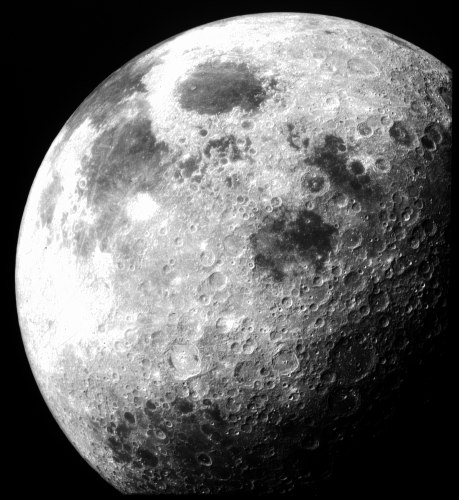Should humans return to the Moon?
Interview with
Although unmanned trips to the moon are currently being planned, no human has  visited the lunar surface since December 1972, and some people might say that's for a very good reason!
visited the lunar surface since December 1972, and some people might say that's for a very good reason!
Apart from being inordinately costly, human spaceflight is also far more dangerous than the Apollo programme successes have led us to believe. So should people return to the Moon?
Anita Heward, from the Google Lunar X Prize, Ian Crawford from Birkbeck College and David Rothery from the Open University share their thoughts with Kat Arney...
Anita - I really hope so. Apollo all happened before I was born and so, I've never experienced seeing somebody walk on the Moon. One of our goals with Google Lunar XPRIZE is to inspire the next generation of scientists and engineers. I think it's hugely exciting as we've just talked a little bit about the commercialisation; the fact that it's not just nations. It's the fact that many different people and organisations of many different nationalities can now be involved in going and exploring the Moon. And as Ian was saying, the opportunities with a Moon base for exploration of the Solar System become so much more attractive. I think we really need that big vision for exploration that really has been missing for most of my lifetime.
Kat - Ian, where is your take on this? Do you think that it is worth sending humans back?
Ian - Yes, even just considering science, leaving aside the possible economic benefits, just scientifically, robots can achieve a certain amount. They lead the way. They can provide the recognisance of planetary bodies. But when you want to really learn about things in-depth, I think one of the legacies of Apollo was that having boots on the ground really makes those scientific expedition so much more capable. So I mean, no doubt that by sending people back to the Moon and establishing a lunar base which you should envisage as something like an Antarctic Research Station. Just as having bases in Antarctica has permitted a lot of science in Antarctica that otherwise wouldn't happen. Having human bases on the Moon will permit a lot of science that otherwise we just won't do. So, I think absolutely. there's a very strong case for returning humans to the moon.
Kat - Although the costs are extremely high and also, the cost potentially in terms of human life, do you feel that that is a tossup worth counting?
Ian - Yes, I do think it's worth. Obviously, it's a balance and all exploration is dangerous, right? If you look through history, if you look on the exploration of Antarctica, a lot of people did lose their lives in Antarctica. But does that mean we shouldn't do it? Through our work in Antarctica we've learned about the ozone hole, we've learned about global warming, we worked out the history of the Earth's climate from ice cores over hundreds of thousands of years, and none of that would've been possible if we haven't established scientific outposts in Antarctica. I think if we establish similar scientific outposts on the Moon, we will learn a similarly large amount of information about our place in the universe and we can't know what it is because if we knew the answers, it wouldn't be exploration. It's just that by having a scientific infrastructure on the Moon, I think it's a little likely to lead us to learn much more about the Solar System and our place within it than we will learn otherwise. And yes, I do think that's worth spending the money on and I do think it's worth taking an informed risk to the risk of individuals who would man such research stations.
Kat - So David, what's your take on this? Would you imagine yourself being a moon pioneer? What do you think the next stages are to get men and/or women back on the Moon?
David - Well, I'm too old now. I do remember Apollo 11. I was 13 at that time. It was tremendously inspirational and it will be again next time we get people there. But if I can put my gloomy geoscientist's hat on, we can't stay on this planet forever. If we want our species to survive, we need humans living in space as well. Every 100,000 years, we get a volcano which kills off the world's crops. We can't have all our eggs in one basket. We should be thinking ahead to the future. So, scientific exploration on the Moon, science bases it's a step towards sending people out to live on the Moon and Mars, and in space eventually. We're going to want to do that, aren't we?
Kat - I guess so, but what kind of timeframe could you envisage a small lunar colony being established?
David - It depends I think on the commercial world these days. When Apollo landed, we said we'd have people there in 20 years' time. It hasn't happened. It always seems to be 20 years into the future, but it could have self-sustaining lunar colony there in 20 years if we put our minds to it. I'm not saying we're going to have mass emmigration from the Earth to the Moon, but we could have people living there in a long term basis; at least as long term as people now live in Antarctica.
- Previous Friendships down to your genes
- Next Who owns the Moon?










Comments
Add a comment